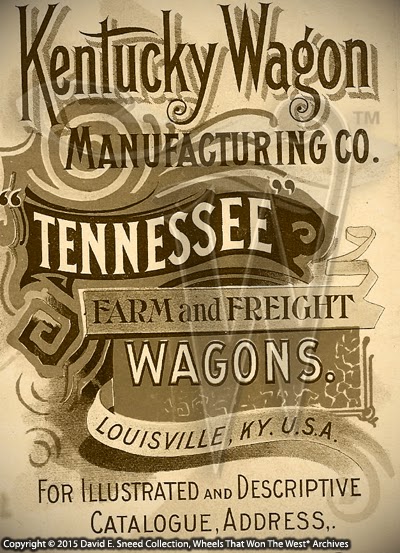In the tattered and fading files ofearly wagon maker history, it’s not uncommon to find a builderembellishing their vehicles with a logo in honor of their home state. The Vaughn Mfg. Company did that withthe name ‘Wisconsin’, as the Springfield Wagon Company did with the ‘Missouri’name. Likewise, Winona touted the 'Minnesota' brand and Alexander Caldwell’s Leavenworth factory proudly promoted the ‘Kansas’wagon. That said, it’s a bit moreunusual to find a builder selling wagons highlighting a state other than their own. That’s the case,though, with the legendary Kentucky Wagon Company (KWC) from Louisville,Kentucky as they placed the Tennessee name on thousands of wagons. So, how does an early wagon makerheadquartered in the Bluegrass State get to the point where they’re marketingwagons promoting the Volunteer State?
 |
| This cover is from an 1890’s-era promotional flyer for Tennessee brand wagons built by the Kentucky Wagon Company. |
We know that the Kentucky Wagon Companybuilt and sold countless wagons with the brand name of “Kentucky.” It’s a natural association that makessense. So, how does Kentucky’s neighboringstate fit in here? Known for its OldHickory and Kentucky brands, KWC also built wagons under the label ofStudebaker Model, American, and Tennessee. My July 11, 2012 blog included a few details about the Kentucky Wagon Company but the legacy ofthe firm runs a lot deeper. As I’vewritten before, the “Studebaker Model” brand was derived from the same patternsand designs as those of the original Studebaker wagons built in South Bend,Indiana. You can read more about thisarrangement in an article I wrote for Farm Collector magazine back in June of 2004.
 |
| This catalog cover from 1893 references the still-fresh transition of Tennessee wagons from the firm of Cherry, Morrow & Co. to Kentucky. |
The truth of the matter is that KWC’s“Tennessee” label is a brand that originated with another wagon maker. In fact, the name and logo actually predatesthe formation of the Kentucky Wagon Company altogether. According to government trademark records,the first use of the Tennessee name on a wagon was on January 1, 1878. At the time, the firm building these wagonswas known as Cherry, Morrow and Co., located in Nashville, Tennessee. The company started out under the name ofCherry, O’Connor & Co. in 1871. By1873, they were using prison labor from the State penitentiary as the primaryworkforce. During the 1880’s, Tennesseewagons were distributed throughout the southern U.S. as well as in Iowa,Illinois, Indiana, Ohio, Nebraska, Kansas, and the Dakota’s. In addition to wagons, the company also builtstoves, furniture, and the Sarven patent wheel. Vehicles in the original Tennessee-branded line included deliverywagons, farm wagons, log wagons, emigrant wagons, spring wagons, carts, andarmy wagons. By 1885, the companyboasted sales of more than 17,000 Tennessee wagons and, within two years, thatnumber had increased to over 20,000; a rate that equaled 75 vehiclesfinished each day. In January of 1890,the company’s lease with the state prison system expired and, with the growingresistance to using incarcerated labor, a decision was made to sell the entirefirm to the Kentucky Wagon Company in Louisville.
By the time Kentucky purchased theCherry-Morrow factory, the Tennessee brand was an extremely popular andwell-established name. Hence, there wasgreat value and opportunity in keeping the Tennessee tag alive and well. It’s inclusion with Old Hickory andKentucky-labeled wheels only added to KWC’s growing market share, distribution,and bottom line.
Like most early wood-wheeled creations,the majority of the Tennessee vehicles have not survived. But, for those that have, their roots rundeep into the heart of America and the West. During peak production times for the Kentucky Wagon Company, the firmwas responsible for building tens of thousands of wagons in a given year. From military escort wagons and sheep wagonsto chuck wagons, log wagons, farm wagons, drays, and more, KWC built transportation for a broad range ofuses.
PleaseNote: As with each of our blog writings, allimagery and text is copyrighted and may not be broadcast, published, rewritten,or redistributed without prior permission of David E. Sneed, Wheels That WonThe West® Archives.